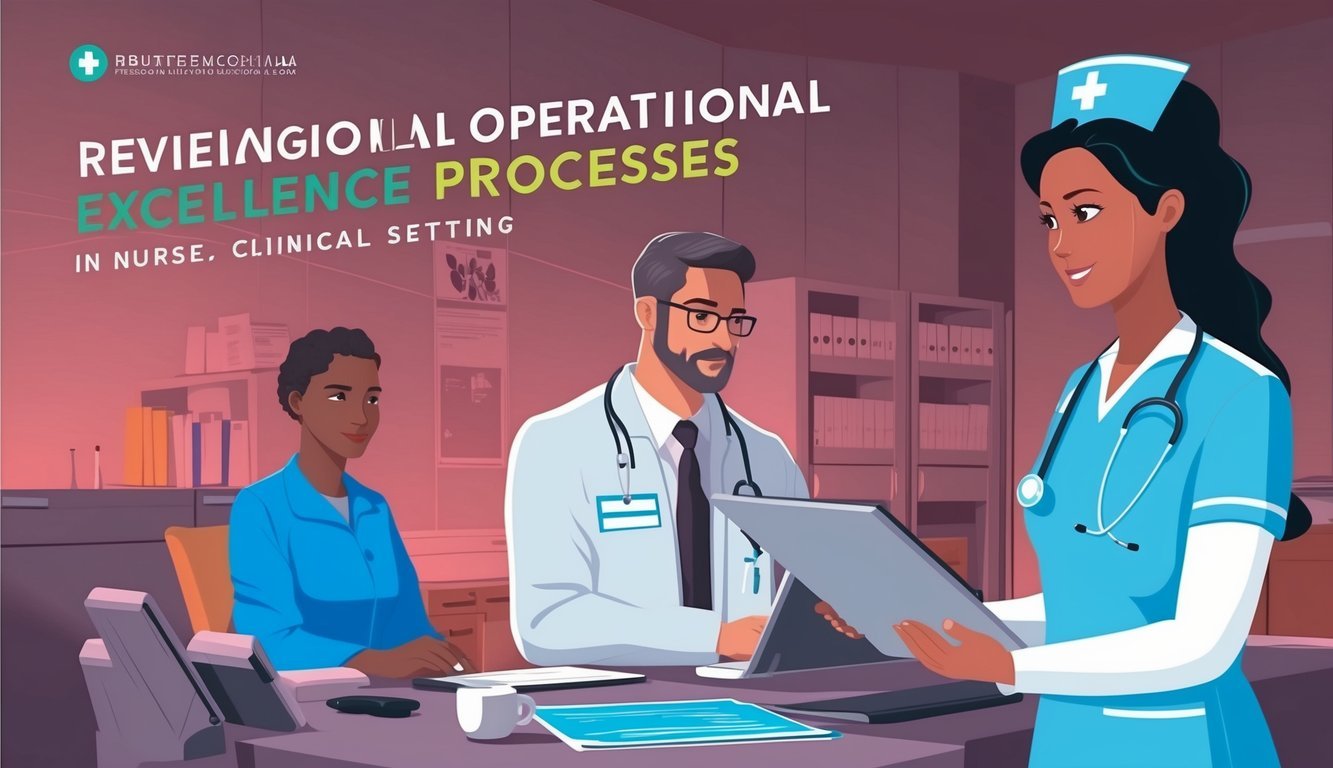As healthcare costs continue to rise, the role of a Utilization Review Nurse becomes increasingly vital. Utilization Review Nurses evaluate medical necessity and appropriateness of care to ensure patients receive the right treatment while managing costs effectively.
This position not only helps healthcare facilities optimize their resources but also plays a crucial part in patient care by ensuring that treatments are justified and beneficial.
To become a Utilization Review Nurse, you’ll typically need a Bachelor of Science in Nursing and be a licensed Registered Nurse.
This educational background equips you with the essential skills required for assessing treatment plans and making informed decisions based on clinical guidelines and patient needs.
As you advance in your career, your experience can lead to increased responsibilities and opportunities within the healthcare system.
For those interested in this career path, understanding how to navigate the complexities of healthcare reimbursement and utilization management is key.
Utilizing resources from sites such as Nurse.org can provide valuable insights into salary expectations, job responsibilities, and the skills needed to succeed in this rewarding field.
Role and Responsibilities
Utilization review nurses play a crucial role in ensuring that patients receive necessary care while also managing healthcare costs.
Your responsibilities extend beyond just patient assessment; they involve collaboration and thorough documentation to optimize patient outcomes.
Patient Care Coordination
As a utilization review nurse, your primary focus is on patient care coordination.
This involves evaluating medical necessity and appropriateness for treatments through comprehensive analysis of medical records.
You assess clinical data, ensuring that care aligns with established guidelines and standards, which assists in avoiding unnecessary procedures that could lead to claim denials.
The role requires strong communication skills to interact effectively with patients, physicians, and other healthcare professionals.
You may need to educate patients about their treatment options and the rationale behind certain medical decisions.
Good documentation practices are essential, as they support your assessments and facilitate smooth transitions in care.
Concurrent and Retrospective Review
You engage in both concurrent and retrospective reviews.
In concurrent review, you analyze ongoing patient care to confirm that treatments meet criteria for medical necessity while patients are still receiving care.
This proactive approach allows you to intervene if a particular service is deemed unnecessary.
During retrospective review, you evaluate patient records after care has been delivered.
You review medical documentation to ensure compliance with regulations and standards.
Both review types are vital for working with insurance companies to secure reimbursements and avoid payment denials, as you play an integral role in optimizing reimbursement processes.
Collaboration with Healthcare Team
Collaboration is key.
You work closely with a variety of healthcare professionals, including doctors, social workers, and case managers.
Your role involves sharing insights from medical reviews to foster informed decision-making and care plans that align with patients’ needs.
Effective communication with these professionals ensures that everyone is on the same page regarding patient care strategies.
You also act as a liaison between patients and their healthcare providers, advocating for necessary services while managing costs.
Your clinical experience informs these discussions, helping to bridge gaps in understanding and enhancing patient outcomes.
Educational Pathway
Becoming a utilization review nurse requires a specific educational background and ongoing professional development.
You will need to follow a structured pathway, which includes obtaining a nursing degree and gaining relevant certifications, as well as engaging in continuing education.
Nursing Program and Certifications
To become a utilization review nurse, you should first pursue a nursing degree.
Options include an Associate Degree in Nursing (ADN) or a Bachelor of Science in Nursing (BSN).
While an ADN allows you to enter the workforce sooner, a BSN opens doors to advanced opportunities and roles.
After completing your nursing program, you must pass the NCLEX-RN exam to become a Registered Nurse (RN).
Many UR nurses later seek additional certifications such as the Nursing Case Management Certification, which enhances your skills in managing patient care effectively.
These credentials not only validate your expertise but also increase your marketability in this competitive field.
Continuing Education and Professional Development
Continuing education is crucial in the nursing field as it keeps you updated on regulations and best practices.
Most states require RNs to complete a certain number of continuing education hours to maintain licensure.
You may also consider pursuing a Master of Science in Nursing (MSN) to specialize further.
Programs often include advanced courses in healthcare management, and many offer options specific to utilization review.
Engaging in professional organizations, attending workshops, and participating in webinars can also enhance your knowledge and skills essential for this role.
Employment and Salary Outlook

The employment outlook for utilization review nurses is promising due to an increasing need for healthcare efficiency.
As healthcare systems continue to evolve, the demand for professionals who can assess and manage patient care resources is growing.
Below is a closer look at job market analysis and the various healthcare sectors where you might find opportunities.
Job Market Analysis
The job market for utilization review nurses is expanding, largely driven by the growth in healthcare spending and the need for cost-effective care.
According to the U.S. Bureau of Labor Statistics, roles in healthcare management are projected to grow by 32% from 2020 to 2030.
This growth creates a robust career path for utilization review nurses, allowing for diverse opportunities.
Salary Expectations
Utilization review nurses can expect varying salaries based on experience and geographic location.
Typical annual salaries range from $70,596 to $107,467, with a median around $89,700.
This salary trend reflects the increasing recognition of their role in healthcare management.
For more detailed salary information, visit Salary.com.
Healthcare Sectors and Work Environment
Utilization review nurses work across various healthcare settings, including hospitals, private practices, and insurance companies.
Each sector offers unique challenges and rewards.
Primary Sectors:
- Hospitals: Collaboration with clinical teams to ensure necessary services are delivered.
- Insurance Companies: Assessing claims for medical necessity and efficiency.
- Private Practices: Supporting small practices in managing patient care workflows.
The work environment can vary significantly.
For instance, hospital-based positions may involve fast-paced rounds and direct patient assessment, while insurance roles may be more office-based, focusing on documentation and analysis.
Impact on Healthcare
Utilization review nurses play a crucial role in enhancing the effectiveness of healthcare delivery.
Their involvement leads to improved quality of care and adherence to healthcare policies, which ultimately affects patient outcomes and cost management.
Quality Improvement and Cost-Effectiveness
Utilization review nurses contribute significantly to quality improvement initiatives.
By assessing the necessity and appropriateness of treatments, they ensure that patients receive the best possible care.
Key Responsibilities:
- Reviewing treatment plans
- Implementing best practices
- Monitoring patient progress
By identifying overutilization of unnecessary services, these nurses help reduce healthcare costs.
In doing so, they improve cost-effectiveness within the system.
According to various studies, organizations that employ utilization management strategies experience a notable reduction in expenditures without compromising quality care.
Healthcare Policies Compliance
Adherence to healthcare policies is vital for maintaining accreditation and enhancing patient safety.
Utilization review nurses ensure compliance with regulatory standards and organizational protocols.
They also provide training and resources to healthcare providers regarding these policies.
Compliance Factors:
- Regulatory standards
- Evidence-based guidelines
- Documentation and reporting
Effective compliance leads to improved patient outcomes and mitigates the risk of legal issues.
By closely monitoring adherence, utilization review nurses can identify gaps and facilitate corrective actions.
Their expertise supports healthcare providers in aligning with healthcare policies, enhancing overall service delivery.
Operational Excellence

Achieving operational excellence as a utilization review nurse involves mastering case management and honing analytical and time management skills.
These competencies are essential for ensuring efficient patient care and optimizing healthcare resources.
Case Management
In the realm of utilization review nursing, effective case management is crucial.
You are tasked with evaluating patients’ care plans and determining the medical necessity of treatments.
This process often involves collaboration with various healthcare providers to optimize patient outcomes.
Your clinical knowledge plays a vital role in assessing treatment plans.
Understanding patient conditions helps in identifying unnecessary procedures and advocating for alternative care options when necessary.
Familiarity with Electronic Health Records (EHR) is also key, as it allows you to retrieve and analyze patient data efficiently.
When navigating insurance claims, your ability to articulate the medical necessity of services can significantly impact reimbursement success.
Managing cases well can lead to better patient flow and reduced lengths of stay, delivering both quality care and financial benefits.
Analytical and Time Management Skills
As a utilization review nurse, you need strong analytical skills to evaluate complex clinical information.
You must assess treatment plans against established guidelines to ensure appropriateness.
This involves scrutinizing data and making informed recommendations based on your findings.
Effective time management complements your analytical capabilities.
Balancing multiple cases requires prioritization and organization.
Creating to-do lists and setting deadlines can help ensure timely completion of reviews.
Utilizing software tools can also streamline your workload and maintain focus on critical tasks, further improving productivity.
Incorporating these skills into your daily routine can enhance your effectiveness.
By staying organized and leveraging data analysis, you contribute to both enhanced patient care and operational efficiency within the healthcare setting.

